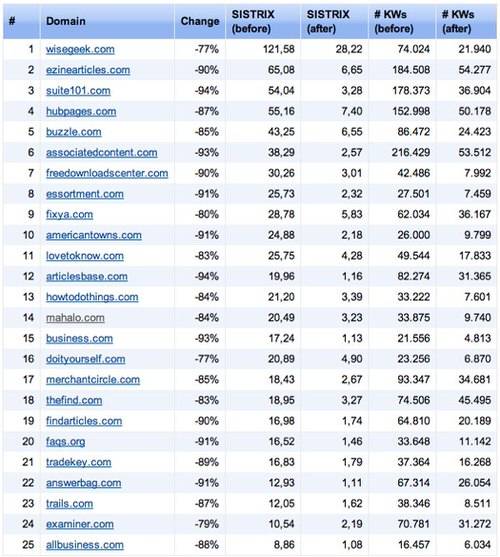Google made a change to its search algorithm last week that it said was designed to help users find more “high-quality sites.” Although Google never described this move as one aimed at tackling the problem of content farms, many observers have viewed the algorithmic adjustments as Google’s attempt to clean up its search results, following a number of complaints about the quality (or lack of quality) of the information in the sites that are retrieved and are highly ranked.

Google did say that the change would impact over 11% of sites, but would help surface those “with original content and information such as research, in-depth reports, thoughtful analysis and so on.”
So, is a search via Google better now? Is original content easier to find while content farms are buried on subsequent results pages?
SEO consulting company Sistrix has done some number crunching on a dataset of 1 million keywords to identify some of the winners and losers from the change. Using an index calculated from traffic on keywords, rankings and click-through rates, the company identified the biggest losers from Google’s change.

Those with the biggest loss in their keyword positions include associatedcontent.com, suite101.com, ezinearticles.com, and hubpages.com. Interestingly, for an update that many said was aimed at content farms, Demand Media’s ehow.com doesn’t make the list of biggest losers.
But on Sistrix’s list of the 300-some-odd domains impacted are several sites that might raise eyebrows, including Technorati, PR Newswire, Songkick and Slideshare. Obviously these sites aren’t the creators of original content, but it’s hard to imagine that they’re viewed as quite the same sorts of scourge of search results as content farms. It isn’t clear why they’ve lost favor with the new algorithm, but it may be that these and other useful sites will move up the rankings again. (Although what’s “useful” is in the eye of the beholder and in the eye of Google engineers, one might argue.)
It will also be interesting to see how the sites that were dinged respond, as the battle for clicks and the battle against spam rages on.
Have you noticed an improvement in search results since Google’s change last week?









